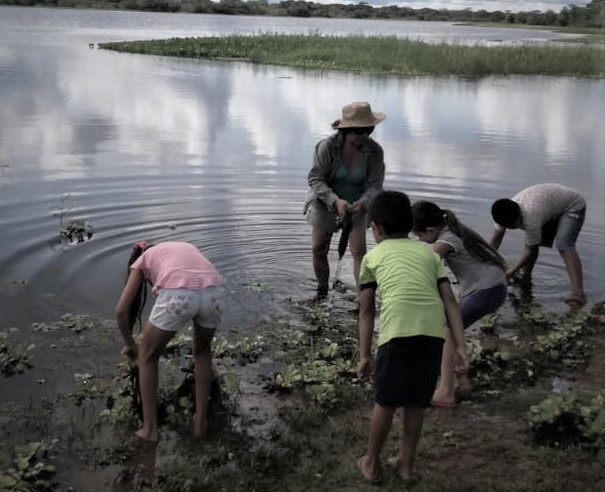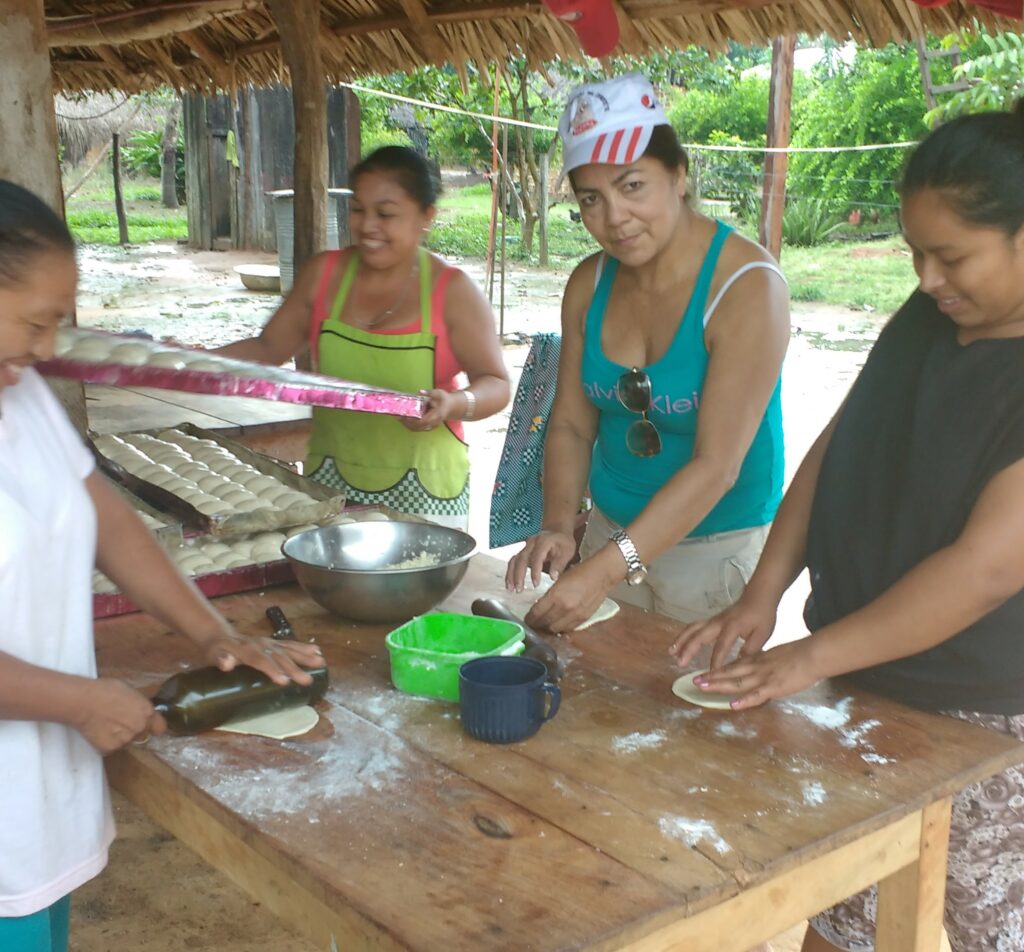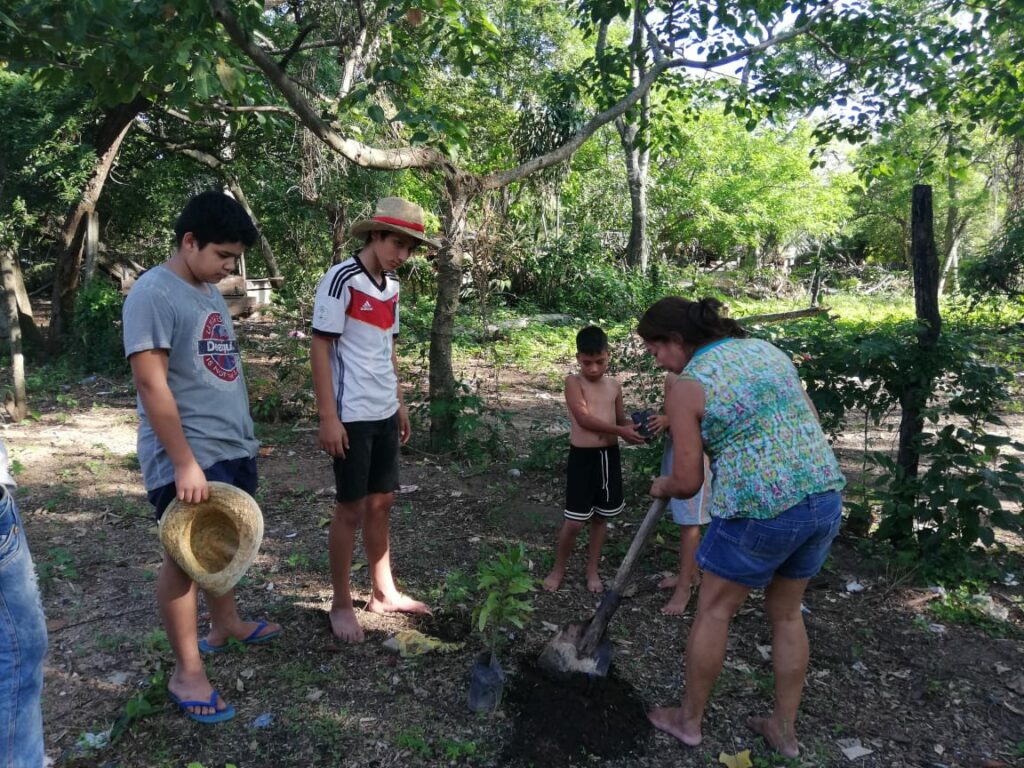Educating the children to a new awareness of nature and its creatures in a still uniquely attractive, natural environment. A creative and sustainable, instead of a destructive approach to nature should be made tangible. In order to increase this, a reflection and attitude towards one’s own life that has so far received little attention should be stimulated.
“If this project was just about planting trees, gardening, baking bread with the kids (there is a shortage of that) and to offer lessons with previously unnoticed impulses, then that would be a continuation of the contribution we have made since 1998. In order to illustrate the planned long-term perspective, a more detailed description of the poverty of the place, the lack of prospects, the lack of interest of its residents and the disorientation and neglect of the growing generation would have to go beyond the scope of this concept. The exploitation of nature still dominates instead of the regenerative use of natural resources.” Klaus Braunert from SIMBIOSIS – Mensch und Natur e.V.
Piso Firme is a place on the border with Brazil, far from larger places with better infrastructure and difficult to reach. The residents are not an indigenous community, but the mestizos typical of the lowlands of Bolivia, remnants of the indigenous population and immigrants from the interior of the country. Unifying traditions are largely limited to the exercise of religious commonalities. And apart from the representatives of political parties striving for influence and meetings being held, public life consists of coincidences rather than coincidences. The numerous children grow up without being taught any special values or abilities. They are largely left to their own devices and learn the little that primary school teaches them and gain experience in dealing with their environment and adults. They learn skills that give them a better understanding of their society, the natural foundations of life surrounding them and successful participation in society either accidentally or not at all. This is where our work begins.

Despite the difficulties involved in managing a project that is far away, it has so far succeeded thanks to the special commitment of the Bolivian Maribel Añez and her ever-growing interest in this place. At the beginning of each year she went there once or twice and initially stayed there for about three to four months each time. During this time she has intensified the ties she has had with the residents for twenty years and is enthusiastic about the preservation of the site. For the last two years she has been living mainly in Piso Firme and only takes the path, which is only passable with obstacles (especially during the rainy season), to do the necessary shopping in Santa Cruz de la Sierra, to deal with the authorities and also to visit her family . In the meantime, she has formed friendships of varying intensity with the residents of the village. Some, particularly a group of women with whom she works regularly, are on friendly terms with her and help her efforts as much as they can and their time apart from their own livelihoods. These activities also include activities that are mutually beneficial, such as making bread together or eating meals together. Maribel reports that the place has now become her real home and that after years of this cooperation she feels connected and committed as a member of the community. She has accepted life there as her way of life and renounced life in the city.

Maribel Añez explains her different activities:
- I initially organized meetings with the children and women who showed interest and took part, where food was prepared with the children, who were often unbalanced and sometimes badly nourished. The topics that justify our activities there are discussed.
- Collected and purchased seeds of meanwhile rare and valuable trees were and are collected and sown and planted together. It all starts here so we can watch it grow and flourish. The resulting seedlings are planted in suitable and cleared places in the forest. Each child is given the task of caring for a section because, despite frequent rain and tropical temperatures, the seedlings are exposed to many dangers such as pests and overgrowth. The children learn something about the biology of the forest, the different trees and their interaction in a biotope. At the same time, efforts are being made to renaturate the previously exploited areas.
- We planted several gardens. Vegetables that thrive in this area are grown there: tomatoes, peppers, radishes, which we mix with pineapples. Large crops that need a lot of space, such as bananas, plantains, yucca and melons, are planted in open spaces in the forest. After all, as many children as possible should have access to a jointly laid out garden on the property of their parents’ hut. Maribel takes care of the gardens that have already been laid out.
- A suggestion for something I’ve always wanted to do in Piso Firme: I noticed that the children there are starving. They try to fish all day and then trade their small fish for bread at the town’s two eateries. But they were given little for it, I observed, and it bothers me that they were taken advantage of. So I had a customary clay oven built and I bake bread there with some women. All the children who helped me plant and tend the trees received their bread in return. The idea with the oven and baking was easy to accomplish.
- In a two year period the gardens have yielded and some of the mara and cedro trees planted will benefit those who planted them in later years.
- As I reported, the children grow up here without their parents taking care of them much. Girls therefore usually have their first child at the age of thirteen or fourteen. Neither contraception nor other consequences of unwanted pregnancies are discussed in order to discuss this and other important issues with adolescents. Maribel has been able to gain her trust on this topic over time and a lot has changed for the better. Maribel reports that some teenagers are now attending secondary schools in Santa Cruz without being prevented from doing so by an unwanted early pregnancy.
Project sponsor: Simbiosis – Mensch und Natur e.V.
Funding year : since 2016
Project No.: 68-16ro

